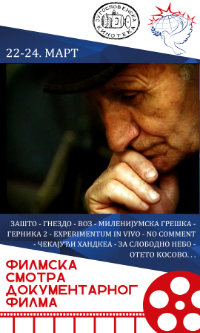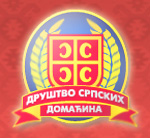Kosovo and Metohija, situation and prospects
| Activities - Comments |

Q.- The situation in Kosovo Metohija is considered perhaps the most difficult since the NATO aggression of 1999. What is your opinion/assessment of what concrete and realistic steps could be taken to find a "right" way out?
R. It is a month now since the situation in Kosovo and Metohija escalated. It was triggered by forcible seizure of municipal mayor offices in four Serbian-majority Municipalities by new mayors, of Albanian descent, recently elected at the local municipal elections.
Elections were held in the wake of the general walkout of Serbs from the institutions, including municipal ones, under the Albanian-run institutions in Pristina claiming to be of so-called Kosovo. This was a collective political gesture of the Serbian people, because Pristina denied them living normal lives. Secondly, those elections were participated by about less than 5 percent of the electorate, almost exclusively ethnic Albanians. Serbs boycotted these elections, protesting, among many other issues, the militarization of the area, confiscation of their private and municipal land for erection of special Albanian forces’ bases, legal and physical insecurity, daily attacks and arbitrary imprisonment of Serbs, noncompliance with 2013 and 2015 Brussels Agreements on establishment of the Community of Serbian Municipalities. Hence, newly elected Albanian mayors were effectively imposed on Serbs who exclusively or predominantly populate those municipalities.
To avoid the worse, the causes must be removed. Concretely, it is necessary to free all unjustly imprisoned Serbs, to withdraw special forces and close their bases in the northern Serb populated districts, to withdraw illegitimate Albanian mayors and to establish Community of Serbian Municipalities as agreed and signed in Brusseles in 201.
The key cause of the prolonged crisis, however, is that Albanian leaders in Pristina have no interest in anything else but recognition of so called “Kosovo Republic” by Serbia. While the Province is still under UN mandate, Albanian leadership supported by their Western promoters, simply ignores UN SC resolution 1244 (1999) and any previously signed agreements, keeps continuously provoking Serbs, violating their basic human rights such as personal security, freedom of movement, private property. About 130,000 Serbs in the Province are treated as hostages in ghettos, whereas additional 250,000 expelled from the Province more than 20 years ago, still are not permitted to return to their homes and properties.
Unfortunately, western countries, primarily the USA, the UK and Germany, keep ignoring such disturbing reality. Apparently, they are not ready to undertake concrete steps to make Albanian leadership comply with UN SC resolution 1244, Brussels Agreements and basic human rights vis-à-vis Serbs. Their double standards policy appears now as punishing Serbia and Serbs by proxy, for not recognizing unilateral illegal secession of Kosovo and Metohija, for remaining military neutral, and for not adopting sanctions against Russia.
Q. - In many parts both in KosMet and outside, there is talk of a possible war. What is his point of view.
R. All that I can say now is that Serbia and Serbs are definitely for committed to peace, a peaceful solution based on the universal principles of International Law and UN SC resolution 1244. Nobody should expect that Serbia will recognize robbery of its sovereignty and territorial integrity. It is extremely dangerous that those same parties who conducted aggression in 1999 and imposed recognition of criminal secession in 2008, are trying now to compel Serbia to legalize all that, thus retroactively converting their actions into being purportedly moral, peace oriented, and free of expansionism and hegemony.
Therefore, provocations of Pristina, whoever may be behind them, must stop, human rights of Serbs must be respected, the signed Brussels Agreements implemented in their original wording, and the dialogue on normalization resumed.
Q - Demonstrations by some political forces against the government continue in Serbia. Are they attempts at a "color revolution"?
R. Weekly demonstrations started some days after the tragic events of last May in one Belgrade school and in the town of Mladenovac, under moto “Stop violence”. After Belgrade, now about 10 other cities hold simultaneous peaceful demonstrations demanding resignations of the Minister of Interior and the Director of Security Agency (BIA), replacement of members of Board of the Regulatory Authority for Electronic Media, replacement of management of the public TV RTS and alike. No doubt that the opposition political forces behind the demonstrations aim at changing the entire government. They insist on installing interim government, first, and holding elections later. The Government seems to be ready to hold early elections but refuses idea about interim government. All this coincides with the growing pressures by leading western powers on Serbian leadership to recognize unilateral illegal secession of the Province of Kosovo and Metohija, to abandon the policy of military neutrality and to introduce sanctions to Russia. While antigovernment demonstrations going on, Ambassadors of certain western powers in Belgrade keep making public statements that Serbs know that Serbia completely belongs to the West.
It is baffling that nobody from the actual government came up to remind them that 85% of Serbia’s population is against NATO, that approximately the same percentage is even against EU membership if conditioned by the recognition of secession of Kosovo and Metohija. Or, to ask such ambassadors if they really believe that Serbs forgot who had enforced most severe sanctions ever on them in the 1990s, who had launched criminal aggression in 1999 that took some 4,000 lives, wounded about 10,000 people, threw 15 tons of depleted uranium, and so on?
Q - I receive from the Province of Kosovo and Metohija, on the daily basis, many criticisms, doubts, perplexities and even attacks concerning the work of the Serbian President A. Vucic. What do you think?
R. I agree that there are reasons to criticize policy of the present government. For example, I think there is the need for Serbia’s leadership to be explicit in demanding full implementation and respect of UN SC resolution 1244 binding every UN member, including EU and NATO members, to respect territorial integrity of Serbia. The government should be much more proactive in international fora with a view to guaranty real genuine security and freedom for Serbs in Kosovo and Metohija. In parallel, there is the need for persistent initiative to guaranty the right to free and safe return of about 250,000 Serbs and other non-Albanians to their homes and their lands in the Province. Who needs now military exercises of Serbia with NATO, in spite of official moratorium?
It should be noted, however, that only a year ago, Aleksandar Vucic was elected President of the Republic in the first round, for the second time in a row. His Party (SNS) also easily won all elections from 2012 to the present day.
We should be mindful and learn lessons from historic experiences. While traying to solve real socioeconomic problems, to improve living standards and democratize governance, we must not repeat mistakes by overlooking dubious positions of some opposition forces about the future status of Kosovo and Metohija, membership to NATO, or sanctions against Russia. I believe that Serbia should continue to balance her political, economic and cultural relations with all countries and integrations which accept her as an equal partner, persistently defending own legitimate interest based on universal principles and international law, and stay neutral.
Thak You. Enrico Vigna,
| < Prev | Next > |
|---|
| Overstatement from Davos 2017. |
Liberal corporative capitalism, for reasons of lowering traveling costs, proposed not to travel to history alone but packed togather with NATO, EU and unipollar World Order. Workers participation has good chances to step in provisionally, buying time for full scale workers selfmanagment. |









